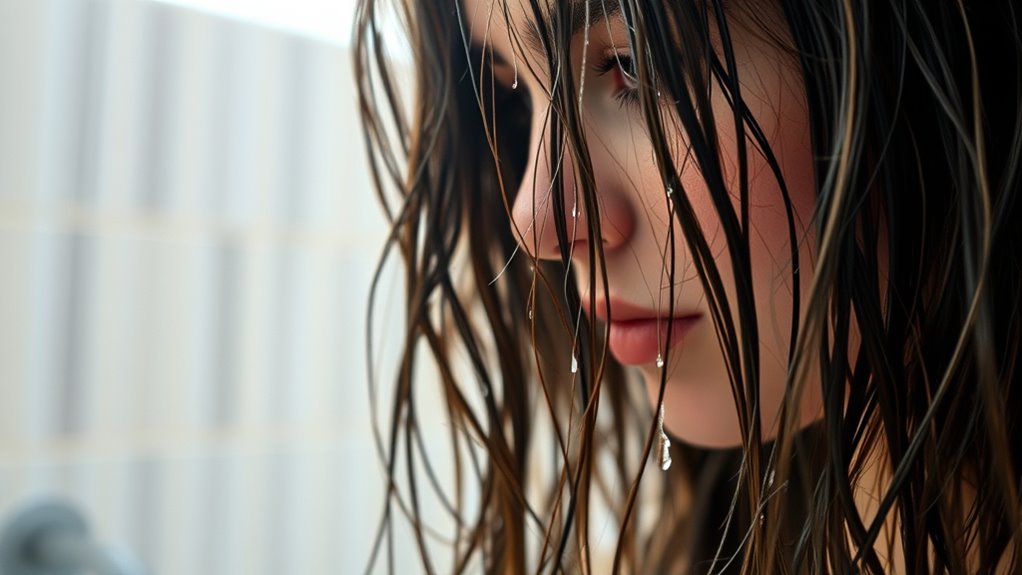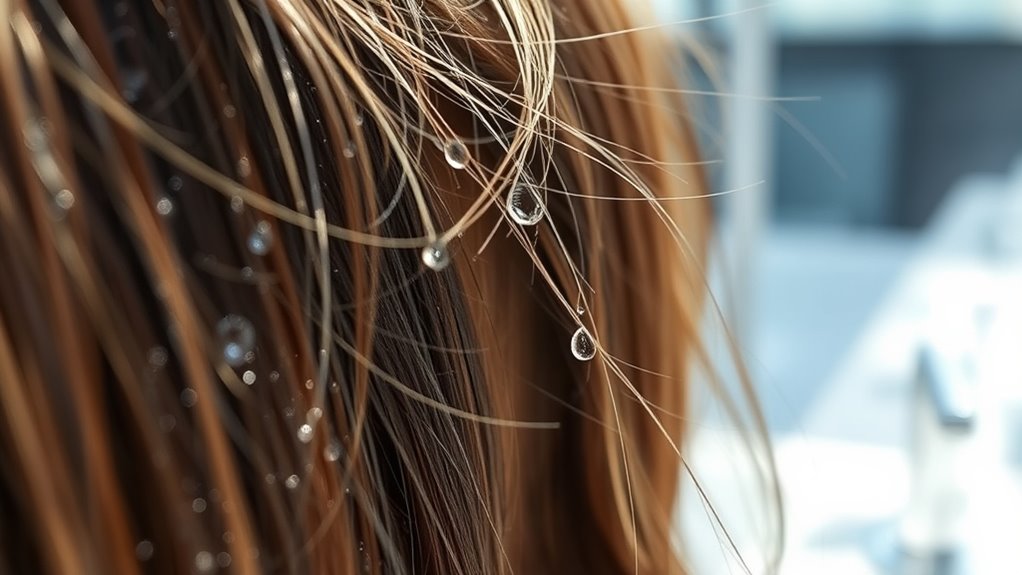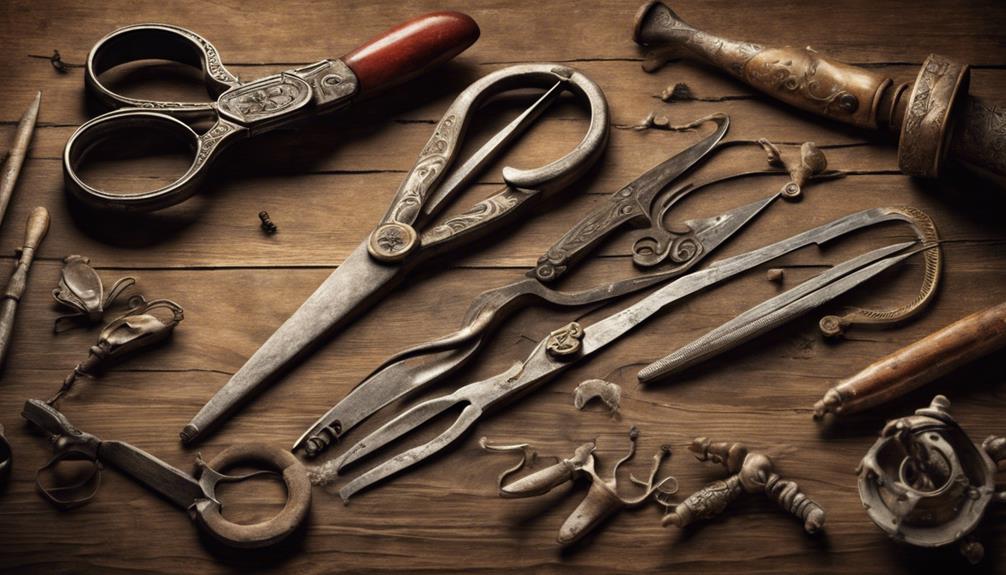If you have hard water, you might notice your hair feels rough, looks dull, or becomes frizzy and brittle over time. Mineral buildup from calcium and magnesium damages your hair cuticles, raising porosity and making it harder to retain moisture. To prevent this, use clarifying shampoos, install water softeners, or try deep conditioning treatments. Recognizing these signs early can help you protect your hair’s health; keep exploring to discover effective solutions.
Key Takeaways
- Mineral buildup from hard water causes rough, dull hair and scalp itchiness.
- Increased porosity damages the hair cuticle, leading to dryness, frizz, and breakage.
- Signs include weighed-down hair, slow drying, and difficulty retaining moisture.
- Use clarifying shampoos, install water softeners, and perform deep conditioning treatments to prevent damage.
- Recognizing early signs helps maintain healthy, shiny hair and reduces long-term damage.

Have you ever noticed your hair feeling dull, dry, or more difficult to manage after showering? If so, hard water might be the culprit. Hard water contains high levels of minerals like calcium and magnesium, which can leave deposits on your hair over time. This mineral buildup can clog the hair cuticle, leading to increased porosity. When your hair becomes more porous, it loses moisture more quickly and becomes more vulnerable to damage and frizz. You might also notice your hair feeling rough or looking lackluster because these mineral deposits can coat each strand, preventing your hair from absorbing nourishing products properly.
Hard water deposits cause hair damage, dryness, and dullness by increasing porosity and blocking nourishing absorption.
Understanding mineral buildup is key to recognizing the signs of hard water damage. When minerals accumulate on your scalp and hair, they can cause your scalp to feel itchy or flaky, and your hair may become more brittle and prone to breakage. This buildup also makes it harder for your hair to retain moisture, which further contributes to dryness and dullness. If you find yourself washing your hair more frequently but still feeling like your hair isn’t responding well, mineral buildup could be the issue. It’s especially common in areas with hard water, where the mineral content is higher and can be difficult to rinse out completely with regular shampoo.
Another factor to think about is hair porosity, which refers to how well your hair absorbs and retains moisture. Hard water can increase porosity by damaging the hair cuticle, making it more permeable. When the cuticle is raised or damaged, your hair becomes less able to lock in hydration, resulting in dry, frizzy, and unmanageable hair. This heightened porosity also makes your hair more susceptible to environmental damage, such as UV rays and pollution. If you notice your hair gets weighed down by product buildup or takes longer to dry, it might be a sign that mineral deposits are affecting your hair’s porosity. Using water filtration systems can help reduce mineral content and prevent further damage from mineral buildup.
Fortunately, there are solutions to combat these issues. Using chelating or clarifying shampoos can help remove mineral buildup and restore your hair’s natural balance. Installing a water softener or using filtered showerheads can drastically reduce mineral levels in your water, protecting your hair from future damage. Regular deep conditioning treatments also help reinforce your hair’s moisture barrier, especially if your hair has become more porous. Being aware of the signs—dullness, dryness, increased porosity—allows you to take proactive steps, ensuring your hair stays healthy, shiny, and manageable despite the challenges posed by hard water.
Frequently Asked Questions
Can Hard Water Damage Hair Color or Highlights?
Yes, hard water can damage your hair color or highlights. Mineral deposits from hard water build up on your hair, especially if you have high porosity, which makes your hair more vulnerable. These deposits can cause color fading or uneven tones over time. To protect your hair, consider using a clarifying shampoo regularly and installing a water softener or filter to reduce mineral buildup.
Are There Specific Shampoos Recommended for Hard Water Hair?
Think of your hair as a sponge soaking up hard water’s mineral buildup. You should look for shampoos with gentle, chelating agents that target mineral deposits. These shampoos are formulated for hair cleansing in hard water, helping remove residue without stripping natural oils. Check the ingredients for ingredients like EDTA or citric acid, which are effective at combating mineral buildup, leaving your hair cleaner, brighter, and more manageable.
How Long Does It Take to See Improvements After Switching Products?
You’ll typically see visible results within 2 to 4 weeks after switching products during your product changeover. Consistency is key; use the new shampoo regularly and give your hair time to adjust. You might notice softer, shinier hair and less buildup as your scalp adapts. Keep monitoring your hair’s response, and if you don’t see improvements after a month, consider trying different products tailored for hard water.
Do Natural Remedies Effectively Remove Mineral Buildup?
Natural remedies like DIY treatments and herbal rinses can help reduce mineral buildup in your hair, but they may not fully remove it. Regular use of apple cider vinegar rinses or herbal infusions can improve your hair’s condition over time, however, for heavy buildup, you might need stronger solutions like clarifying shampoos. Consistency is key, so incorporate these remedies into your routine and be patient for noticeable results.
Can Hard Water Cause Scalp Conditions Like Dandruff?
Hard water can definitely cause scalp conditions like dandruff. It’s like a stubborn stain on your scalp, leading to irritation and flaky buildup. When mineral deposits settle on your scalp, they irritate the skin, promoting scalp irritation and dandruff development. If you notice increased flakes or itchiness, hard water might be the culprit. Using a clarifying shampoo or installing a water softener can help reduce these issues and keep your scalp healthier.
Conclusion
Think of your hair as a delicate garden, thriving with care and attention. When hard water strikes, it’s like a storm that leaves minerals as stubborn weeds, choking your roots. But with knowledge and gentle solutions, you can clear away the debris and restore your hair’s glow. Each wash becomes a fresh sunrise, breaking through the clouds. Embrace prevention, nurture your roots, and let your hair bloom with vibrant life, free from the shadows of hard water.









